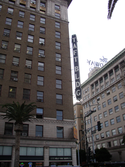Hollywood and Vine
|
|
Hollywood_and_Vine.png
Hollywood and Vine, the intersection of Hollywood Boulevard and Vine Street in Hollywood, California, became famous in the 1920s for its concentration of radio and movie related businesses. The Hollywood Walk of Fame is centered on the intersection.
The historical marker plaque placed at the site by The Broadway-Hollywood Department Store and the Board of Supervisors of the County of Los Angeles reads: "Hollywood was given its name by pioneers Mr. and Mrs. Horace H. Wilcox. They subdivided their ranch in 1887 and called two dirt cross-roads Prospect Avenue and Weyse Avenue. Prospect Avenue, the main artery, was renamed Hollywood Boulevard and Weyse Avenue became Vine Street. This was the origin of "Hollywood and Vine." [1] (http://www.earthsignals.com/Collins/0015/0010_1.jpg)
Today, few production facilities remain in the immediate area; one of these is the Capitol Tower to the north of the intersection; indeed, Capitol Records named its official website "hollywoodandvine.com (http://www.hollywoodandvine.com/)".
The area is probably more associated with homeless people today than with the film industry, but a number of high profile projects in the immediate vicinity are attempting to restore the area to its lost luster.
Historic buildings
On the northwest corner, The Laemmle Building was built in the International Style in 1932 by architect Richard Neutra for Carl Laemmle, of Universal Studios fame. It was significantly altered starting in 1940, and retains few of its original features.
To the west of the Laemmle Building is another famous International building, by Neutra's friend and rival Rudolf Schindler. The building was originally known for Sardi's Diner and is now home to the Cave Theater. To the north is the Palace Theatre, originally the Hollywood Playhouse, built in 1926.
On the northeast corner of Hollywood and Vine is the Equitable Building, a Gothic Deco commercial tower built in 1929 on the northeast corner, designed by Aleck Curlett. Next to it is the famous Art Deco movie house, the Pantages Theatre, built in 1930 by B. Marcus Priteca -- the first of its kind in the United States. The Academy Award ceremonies were held at the Pantages from 1949 to 1959.
On the southwest corner, the B.H. Dyas building was built in 1927 by architect Frederick Rice Dorn. It housed The Broadway-Hollywood department store, which has been defunct since the 1990s, although the famous sign remains.
Just to the south on Vine was the fabled Hollywood Plaza Hotel, built in 1924 and home to silent film star Clara Bow's "It Cafe". Across the street was the site of the second Brown Derby restaurant, in a Spanish Colonial Revival building designed for Cecil B. DeMille; it was demolished in 1994. Father south on Vine were the original Lasky-Paramount Studios, later NBC's West coast studios; and ABC's first West coast studios.
On the southeast corner, the Taft building housed offices for Charlie Chaplin and Will Rogers, and from 1935 to 1945 the Academy of Motion Picture Arts and Sciences offices. The 150-foot building was built in 1923 by architects Walker & Eisen, in the Renaissance Revival style.
Trivia
Astronauts Neil Armstrong, Buzz Aldrin and Michael Collins have stars on the Hollywood Walk of Fame at Hollywood & Vine.
On May 29, 2003, Hollywood and Vine was named "Bob Hope Square" to commemorate Hope's 100th birthday.
Musician Tom Waits released an album titled Heartattack and Vine, a reference to Hollywood and Vine.
External links
- Interactive map of historic sites on Hollywood and Vine (http://hollywoodbid.org/hist/historic_sites.html)
- Hollywood Boulevard - myth & reality (http://www.seeing-stars.com/Streets/HollywoodBlvdMyth&Reality.shtml)
- Historic Resources Group - Historic LA Project (http://www.historicla.com/hollywood/block08.html)

